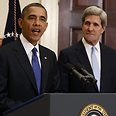
US foreign policy in 'whirlfall'
Op-ed: Whom will Washington be able to turn to when it has to fight to reestablish its security perimeter, reassert its interests – from position of self-imposed weakness?
The disintegration of the communist world meant victory for the liberal democracies. It yielded an "American Moment," the brief window in which the United States was unchallenged in its global hegemony.
But victory also left the West disoriented within a new landscape no longer defined by the bipolar battle between the free world and the Warsaw Pact. Without clearly identifiable villains, the West lost its compass.
Quickly, global militant fundamentalist organizations, fueled by an ideological hatred of the West, attacked it at large and in its heart. America took up arms in response, but the legitimacy of its wars would soon be challenged by the growing number of casualties and concerns over its invasions of foreign territory, while domestic resistance to the spiraling cost of these campaigns, along with tactical and strategic mistakes, stymied their rapid and decisive conclusion.
Appalling flaws in communicating the rationale for and the justice of the Western military enterprises significantly weakened the effectiveness of the operations as a loose coalition of anti-Western forces and opponents to American foreign interventions used every channel at their disposal to delegitimize Washington. The conflicts' narratives were turned on their head: The theme of “War for Freedom” against aggressive Fundamentalists became the object of ridicule and was eclipsed by images of innocent civilians resisting the oppressive Western armies invading their lands.
Elected on a wave of popular discontent with both the economy and America's overseas adventures, President Obama initiated a strategy of reconciliation with the country's enemies, focusing on Arab states and the Muslim world. Pledged to reduce the US footprint in foreign conflicts, the president of the United States adopted a policy of appeasement based on the precept that "it is better to be loved than to be feared."
'Perfect storm'
This policy, which is hastening the voluntary disintegration of the Western sphere of influence, is creating a vacuum into which old and new powers moved with incredulous alacrity, led by Realpolitik statesmen with scant regard to Western sensibilities, undeterred from using force to attain their goals. In the Middle East, in Africa, and in Asia, state actors such as Russia and China, as well as fundamentalist and terrorist groups such as the Taliban or Al-Shabaab, have moved in. Even in parts of South America – America's "back yard" – the United States is being left behind.
Yet, as gentle and as troubling as the president's approach towards the West's adversaries would become, it would be increasingly tougher with America's allies, striking a blow to their interests. All over the world, dismayed friends of the United States have been required to bow to their opponents and to relinquish national security principles they consider fundamental to their survival. Decreeing that his approach would transform anti-American wolves into lambs, the leader of the free world is treating loyal allies as vassals, not only abandoning them to the maelstrom unleashed by his retreat, but handcuffing them by his policy of appeasement. Kept in containment, they remain as wounded soldiers abandoned on the battlefield.
Current US policy may be summarized by a new term, "whirlfall" – a kind of "perfect storm" formed by the whirlpool generated by the United States' declining global presence that is reinforced by the windfall that America's global rivals are reaping from US-imposed policy restrictions on its allies.
Sooner or later, confrontations will start between those rival new great powers, in their quest for strategic interests and natural resources.
Unhampered by scruples, they will be free to wreak war, death and misery in the arenas vacated by America – until, inevitably, they become strong enough and confident enough to raise a frontal challenge to the democratic West itself.
Then, with freedom, liberalism, democracy and its pursuit of happiness under threat, America will have no option but to respond. It will have to fight to reestablish its security perimeter and reassert its interests – but from a position of self-imposed weakness with its associated additional cost in lives and resources.
But to whom will Washington be able to turn for help? Sucked into the raging whirlpool, America's allies will be hamstrung in their attempts to sustain themselves as their rivals nibble at every piece of the cake left to them. Not only will they have little strength to join in a reassertion of Western interests – they will be wary of placing their trust again in their unreliable former ally.
By the time Washington wakes up, the "whirlfall" will be at America's door. But how many of its allies will answer the call when the West needs them most?
Jérôme Vitenberg is an international political analyst. He has taught political science for the London School of Economics and political science via the University of London's International Programs at DEI College, Greece
Originally published by the FrontPage Mag










